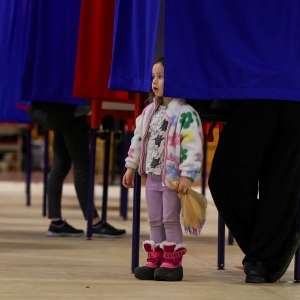Narrow partisan divide dominates legislative session

Rhododendrons bloom outside the New Hampshire Statehouse on Saturday, June 1, 2024. Holly Ramer/AP file photo
| Published: 06-17-2024 12:30 PM |
With Republicans maintaining a narrow majority in the N.H. Legislature this year, they were able to thwart Democratic priorities such as gun safety measures and enshrining abortion rights in the state constitution.
But the partisan split is so tight that Democrats were also able to act as spoilers on Republican-backed legislation such as expanding eligibility for Education Freedom Accounts (also known as school vouchers) and prohibiting “sanctuary city” policies.
There were some areas of agreement. Similar numbers of representatives from each party opposed the final version of a marijuana legalization measure. And there was bipartisan support for many bills, including bail reform and increased state support for homeless shelters.
The 400-member N.H. House of Representatives and the 24-person Senate had a final day of voting Thursday before taking their summer break. There are 200 Republicans, 193 Democrats, two independents and five vacancies in the House, while there are 14 Republicans and 10 Democrats in the Senate.
The outcome of votes on bills often depended on the party affiliation of those who were absent on any given day or portion of a day.
Rep. Sherman Packard, R-Londonderry, presides over the House as speaker.
“I think it was a successful session, but obviously it was an extremely difficult one when you have 400 people and you have maybe a two- to three-vote margin,” he said in an interview Friday.
On the other hand, the tight partisan split forced bipartisanship at times.
Article continues after...
Yesterday's Most Read Articles
 Twelve acres near Concord Walmart cleared for future retail development
Twelve acres near Concord Walmart cleared for future retail development
 25-year-old Concord man identified as Steeplegate Mall RV fire victim
25-year-old Concord man identified as Steeplegate Mall RV fire victim
 Skeletal remains across from state prison identified as Concord fugitive
Skeletal remains across from state prison identified as Concord fugitive
 ‘New Hampshire is just going to embarrass itself’: Former Child Advocate warns against proposed office cuts
‘New Hampshire is just going to embarrass itself’: Former Child Advocate warns against proposed office cuts
 Memorial Field plans, including parking, drainage, track and turf fields, due in the coming months
Memorial Field plans, including parking, drainage, track and turf fields, due in the coming months
 Bow parents appeal court ruling over free speech in transgender athlete protest
Bow parents appeal court ruling over free speech in transgender athlete protest
Packard noted, for example, that the Legislature passed a two-year budget last year with a minimum of squabbling.
The speaker said he’s never been “too keen” on legalizing marijuana for recreational use.
“I thought this year we would get some kind of a bill passed, but we didn’t, and so, I guess we’ll see who the next governor is and we’ll see who the next members of the House and the Senate are and then we’ll see what happens,” Packard said.
Rep. Steven Smith, R-Charlestown, the deputy speaker, said he opposes legalization.
He sees marijuana as a “gateway drug.”
“I listen to experts, the drug dealers themselves, who get you used to this activity by starting you out on pot and then try to upsell you as you go along,” Smith said.
Last month, a federal judge struck down a so-called “divisive-concepts law” passed by New Hampshire Republicans in 2021 that prescribes how teachers may instruct students about racism.
Also in May, Democrats in the House defeated the “Honesty in Education Act.”
This bill was the latest effort to require public school teachers to answer parents when they ask about topics including changes to their child’s gender identity.
However, Republicans in the House and Senate passed on party-line votes a separate measure that expands requirements for notification of parents about sexual-education course material. One provision of that legislation prohibits school districts from adopting policies discouraging school personnel from answering parents’ questions about their children’s well-being and sexuality.
In February, House Democrats voted down a bill that would bar schools from carrying certain books that include sexual content.
Sen. Donna Soucy, of Manchester, the Senate Democratic leader, said in a news conference Thursday that such bills are a distraction, don’t help the public and are counter to “New Hampshire’s Live Free or Die spirit.”
“The GOP agenda has become more extreme and more divisive,” she said.
“In four years that Republicans have held the majorities in both the House and Senate they’ve proposed draconian abortion bans, relentlessly attacked the LGBTQ+ community, made the wealthiest corporations richer and passed a multimillion dollar voucher program with no guardrails for accountability or transparency.”
Soucy said lawmakers should instead focus on issues like adequately supporting public schools and increasing the availability of affordable housing and childcare.
“That’s what we were elected to do, and that’s what Democrats will continue to do when we flip the state House and Senate this November.”
Rep. Jason Osborne, R-Auburn, the GOP majority leader, said Republican advocates for Education Freedom Accounts have children’s best interests in mind, particularly young people who need options other than traditional public schools.
He also questioned the motives of House Democrats who helped reject the marijuana legalization bill, which he supported.
“I think what you saw on the Democratic side was a large number of people who felt they could use this as political leverage in November,” Osborne said.
“And there’s also a few who are first-time representatives who haven’t fought the fight as long as the rest of us have and kind of don’t really realize this is as good as it’s going to get for them.”







 ‘A wild accusation’: House votes to nix Child Advocate after Rep. suggests legislative interference
‘A wild accusation’: House votes to nix Child Advocate after Rep. suggests legislative interference  Sununu decides he won’t run for Senate despite praise from Trump
Sununu decides he won’t run for Senate despite praise from Trump Town elections offer preview of citizenship voting rules being considered nationwide
Town elections offer preview of citizenship voting rules being considered nationwide Medical aid in dying, education funding, transgender issues: What to look for in the State House this week
Medical aid in dying, education funding, transgender issues: What to look for in the State House this week
